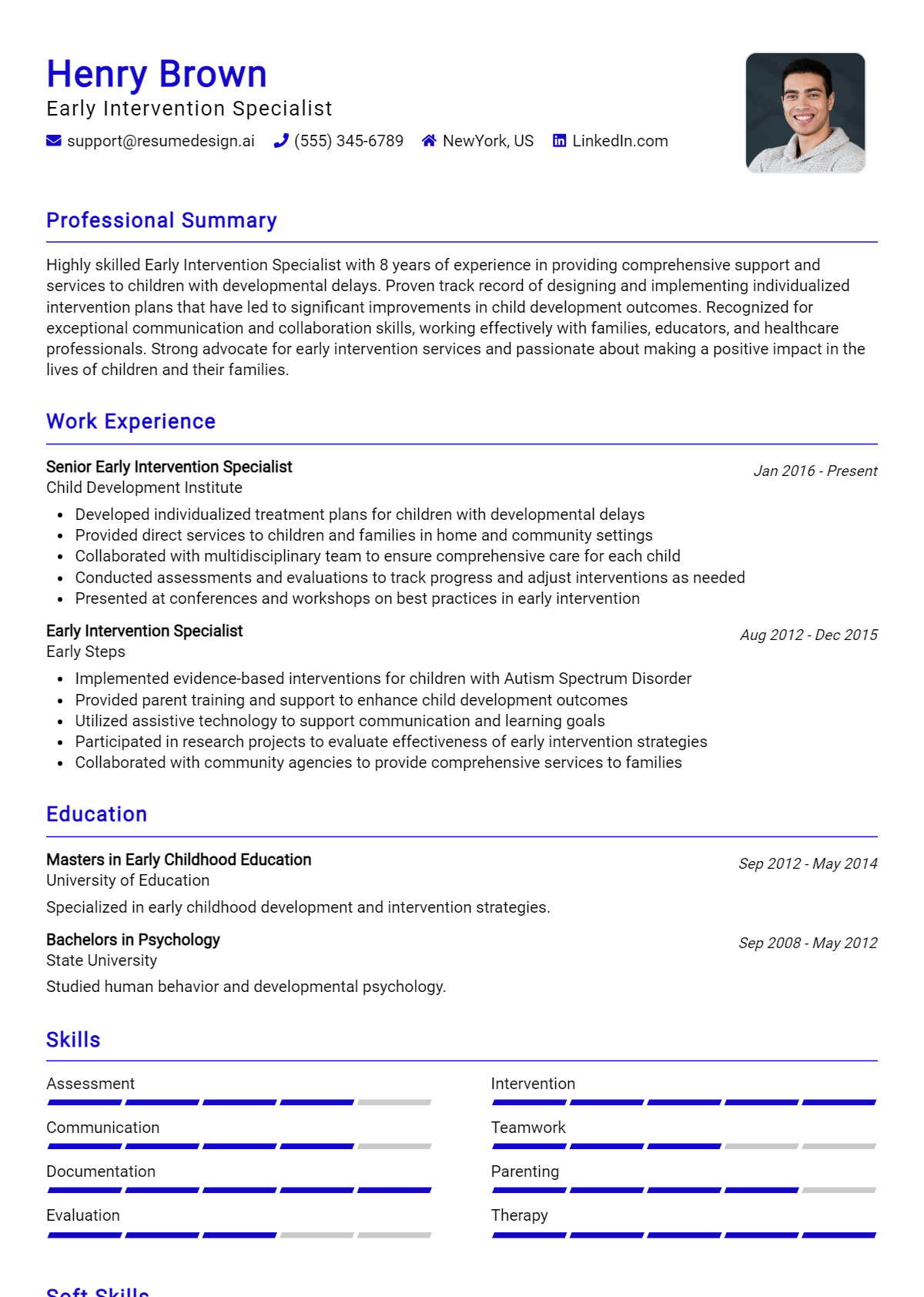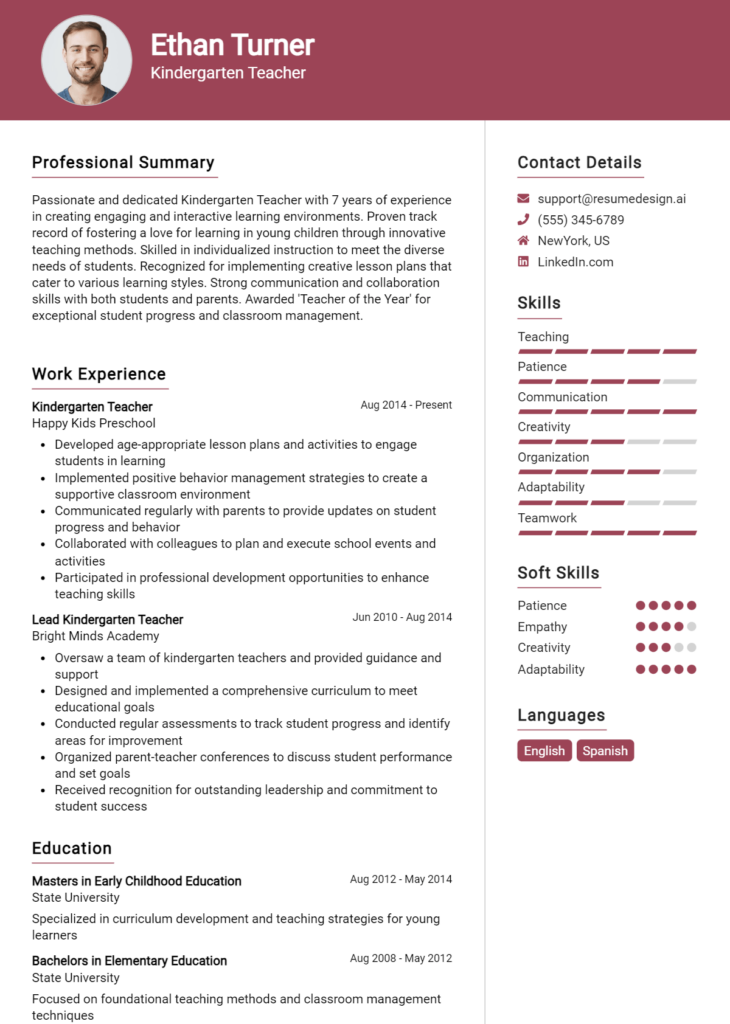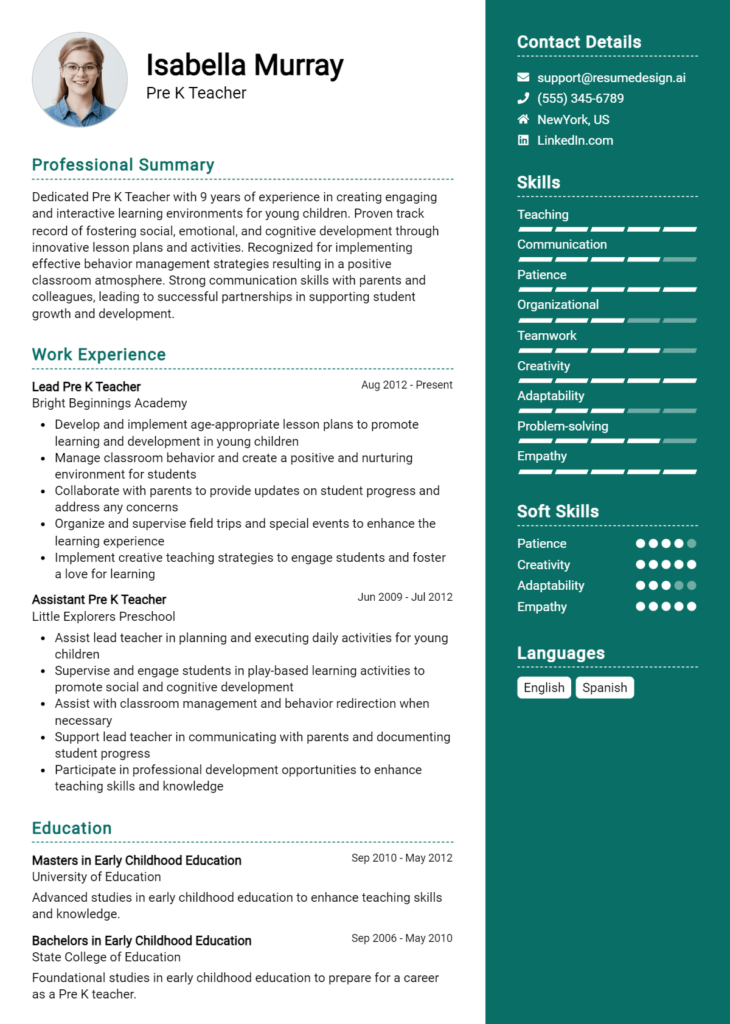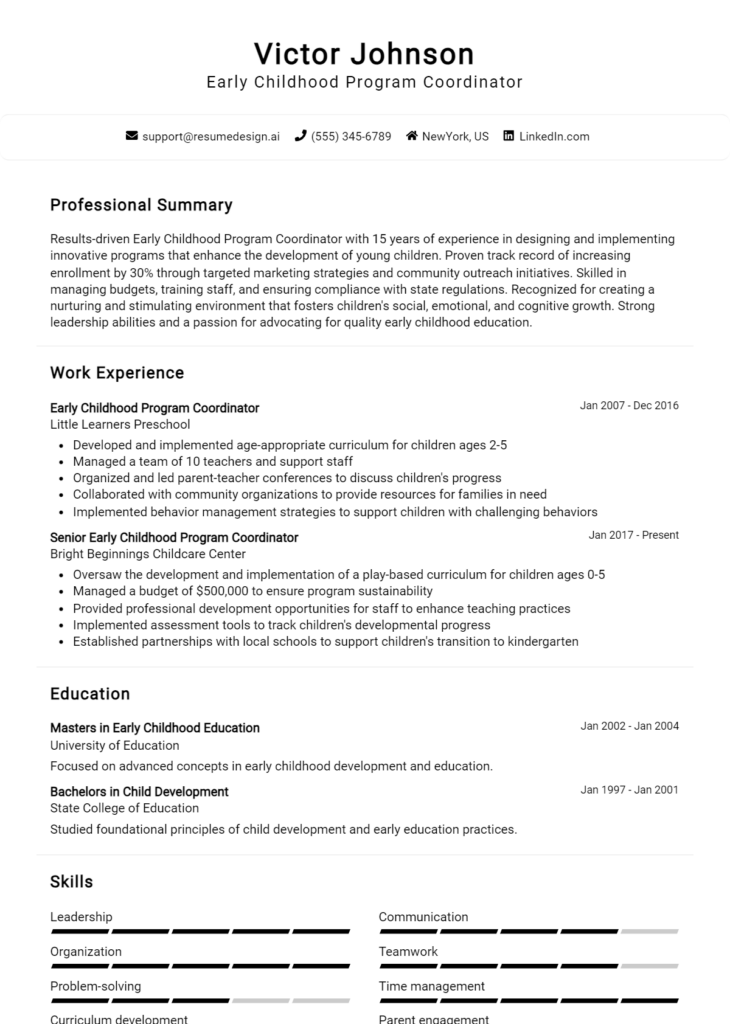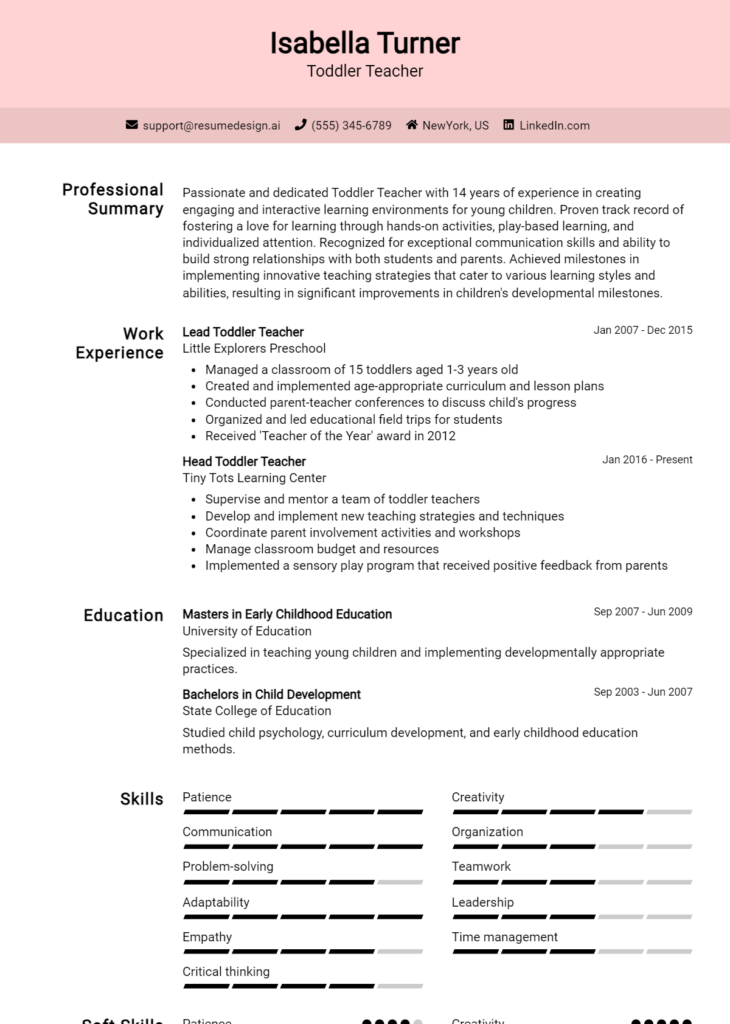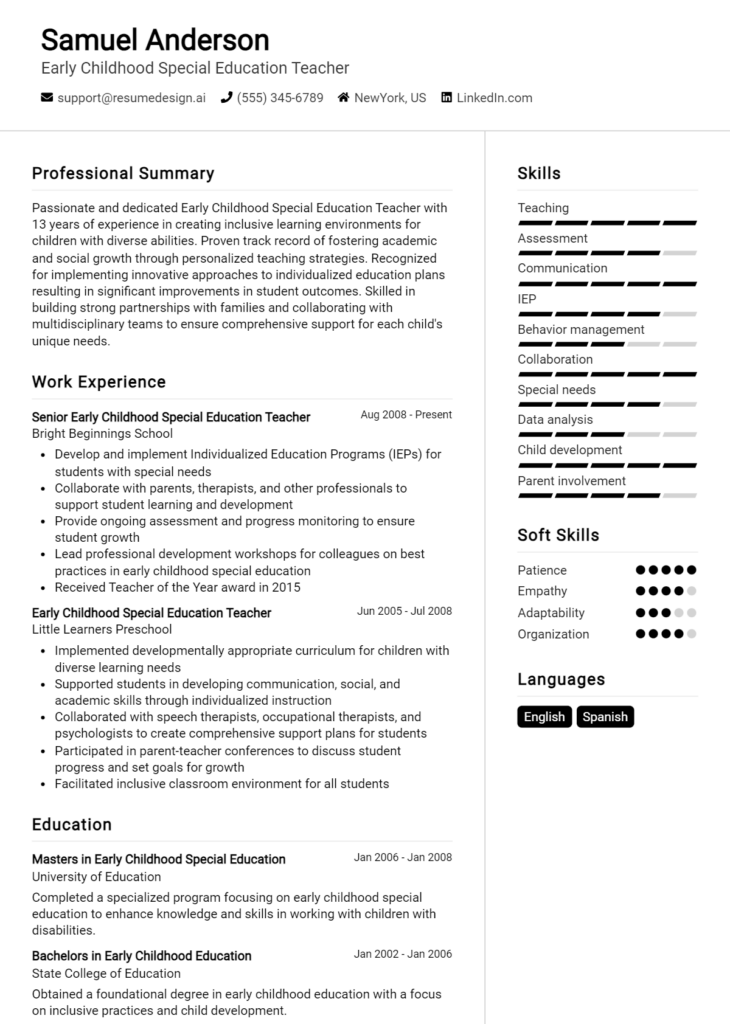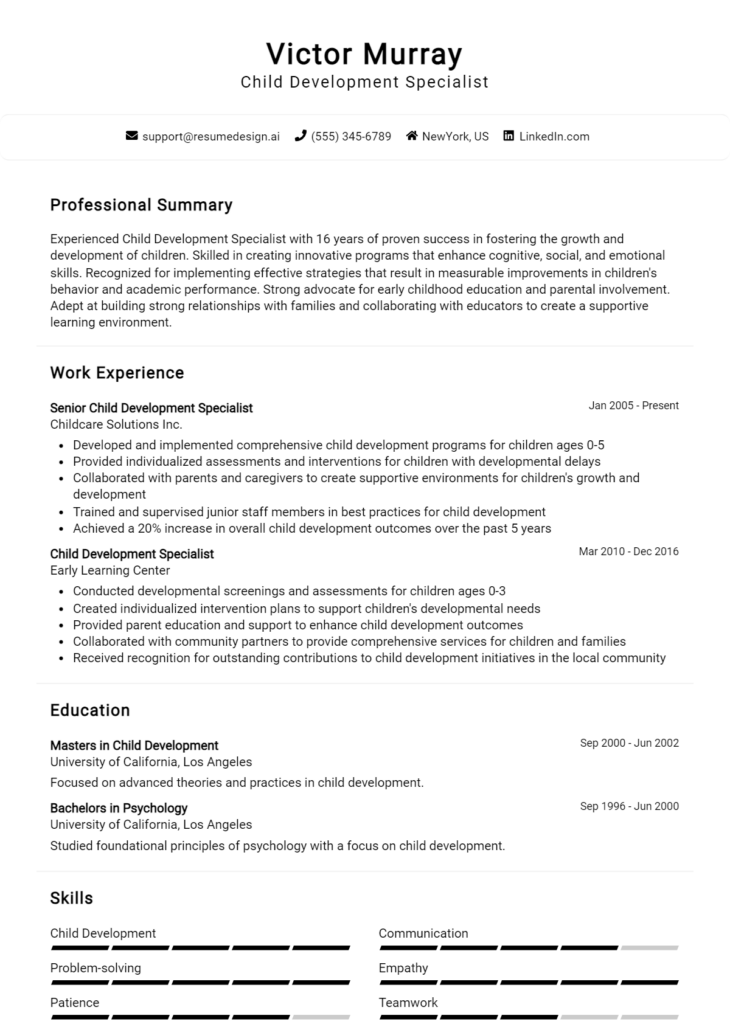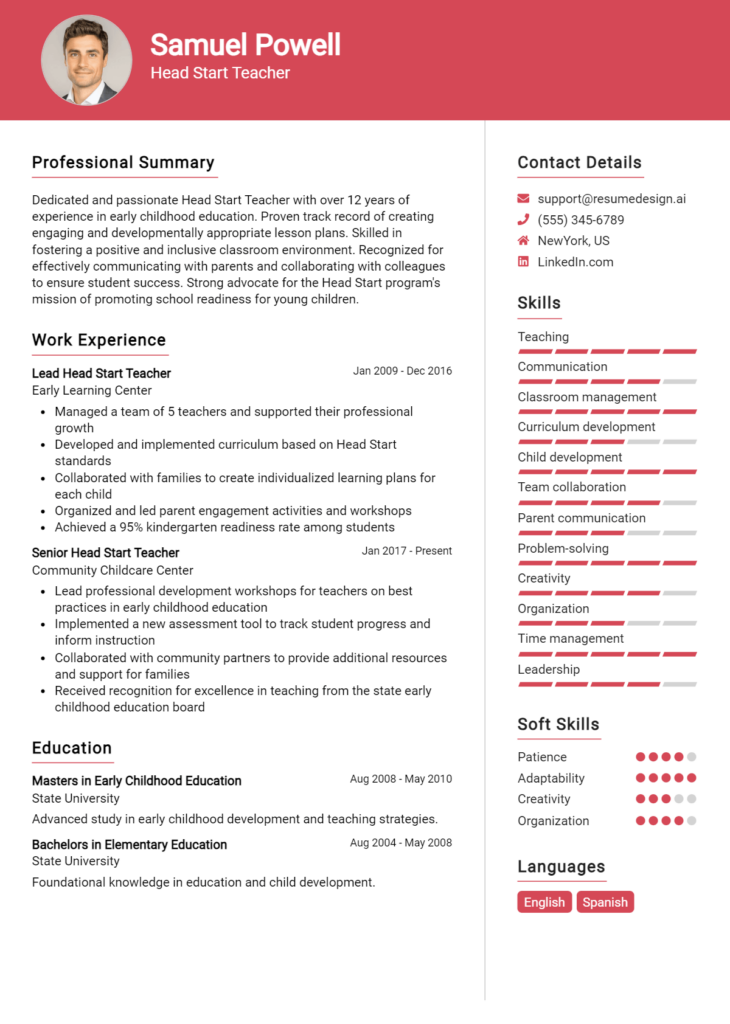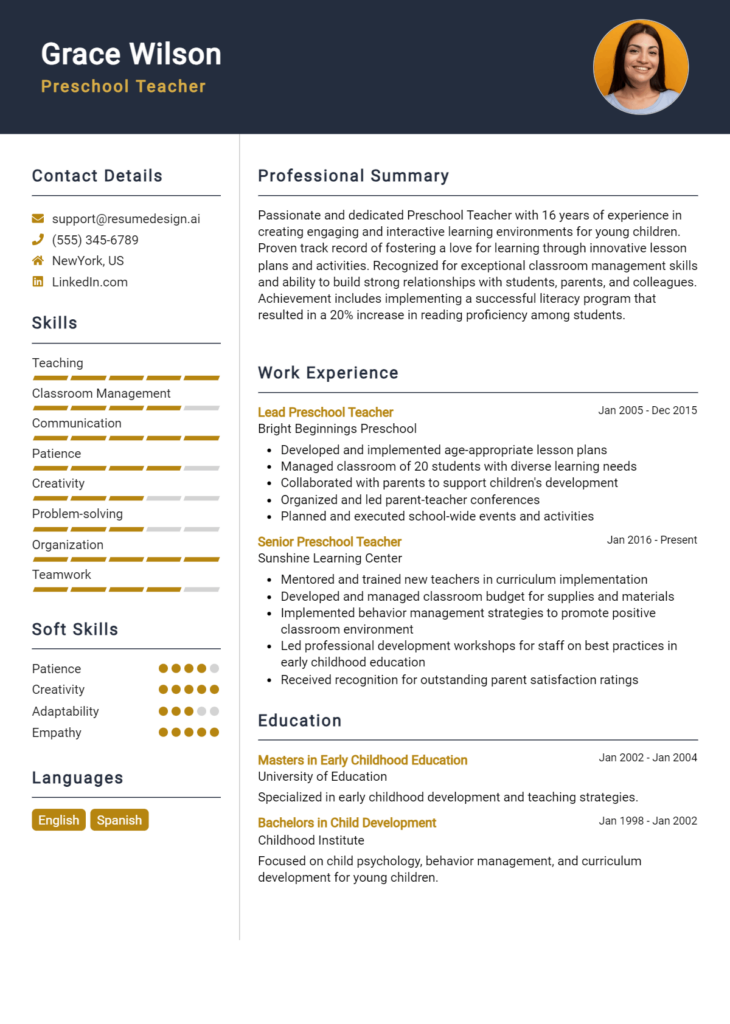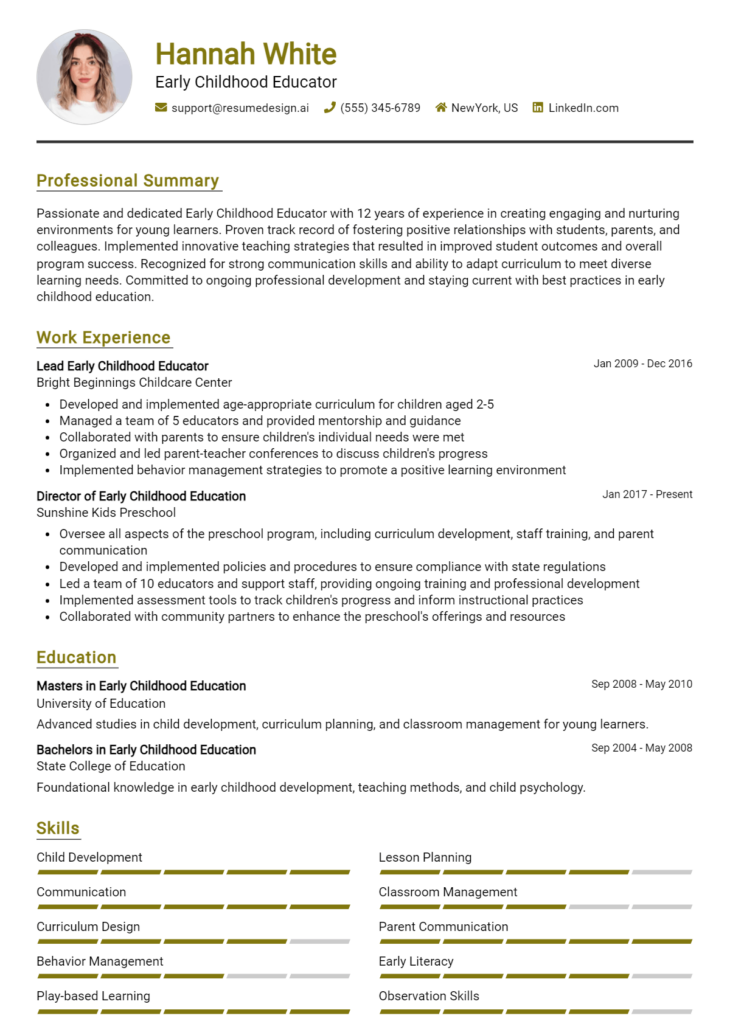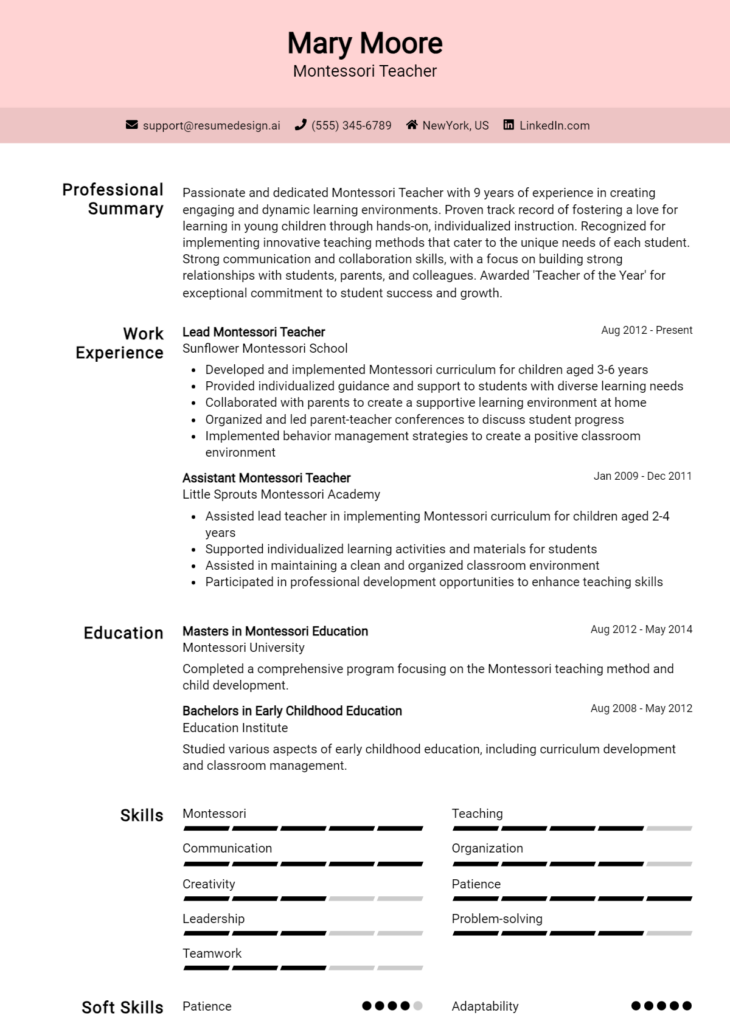Early Intervention Specialist Core Responsibilities
An Early Intervention Specialist plays a critical role in supporting children with developmental delays by implementing tailored strategies and interventions. This position requires strong technical skills in assessment and program development, operational abilities to coordinate with healthcare and educational departments, and exceptional problem-solving skills to address diverse challenges. These competencies are essential in achieving the organization’s goals of fostering child development and family support. A well-structured resume can effectively highlight these qualifications, showcasing the specialist's impact.
Common Responsibilities Listed on Early Intervention Specialist Resume
- Conduct assessments to identify developmental delays in children.
- Develop and implement individualized intervention plans.
- Collaborate with families to provide support and resources.
- Coordinate with healthcare professionals and educators.
- Monitor and evaluate children's progress regularly.
- Provide training and guidance to families on intervention strategies.
- Document and maintain accurate records of interventions and outcomes.
- Advocate for children's needs within various systems.
- Participate in interdisciplinary team meetings.
- Stay current with best practices and research in early intervention.
- Offer emotional support to families navigating challenges.
- Engage in community outreach to raise awareness about early intervention services.
High-Level Resume Tips for Early Intervention Specialist Professionals
A well-crafted resume is essential for Early Intervention Specialist professionals, as it serves as the first impression candidates make on potential employers. In a field dedicated to supporting children and families through critical developmental stages, showcasing your skills and achievements effectively can set you apart from other applicants. A strong resume not only highlights your qualifications but also reflects your commitment to the profession. This guide will provide practical and actionable resume tips specifically tailored for Early Intervention Specialist professionals, ensuring your resume resonates with hiring managers and demonstrates your expertise.
Top Resume Tips for Early Intervention Specialist Professionals
- Tailor your resume to each job description, emphasizing the skills and experiences most relevant to the position.
- Showcase your relevant experience in early childhood education, special education, or related fields, providing specific examples.
- Quantify your achievements where possible, such as the number of children served or improvements in developmental milestones.
- Highlight industry-specific skills, including knowledge of developmental delays, assessment techniques, and intervention strategies.
- Include certifications and training relevant to early intervention, such as CPR/First Aid or specialized workshops.
- Utilize keywords from the job posting to enhance your chances of passing through applicant tracking systems.
- Demonstrate your ability to work collaboratively with families, educators, and healthcare providers through clear examples.
- Keep your resume concise and focused, ideally one page, to maintain the reader’s attention.
- Incorporate a professional summary that succinctly outlines your expertise and passion for early intervention.
- Consider including a section for professional development to showcase ongoing learning and commitment to the field.
By implementing these tips, Early Intervention Specialist professionals can significantly enhance their resumes, thereby increasing their chances of landing a job in this rewarding field. A well-structured resume not only reflects your qualifications but also conveys your dedication to making a positive impact in the lives of children and families. For more insights, check out [resume examples](https://resumedesign.ai/resume-examples/) that can inspire your own resume design.
Why Resume Headlines & Titles are Important for Early Intervention Specialist
In the competitive field of early intervention, a well-crafted resume headline or title is crucial for capturing the attention of hiring managers. As an Early Intervention Specialist, your headline serves as the first impression of your qualifications, summarizing your key strengths in a concise yet impactful way. A strong headline not only highlights your expertise and relevant experience but also aligns with the specific requirements of the job you are applying for. By ensuring that your headline is both relevant and attention-grabbing, you can effectively set the tone for the rest of your resume and make a compelling case for your candidacy.
Best Practices for Crafting Resume Headlines for Early Intervention Specialist
- Keep it concise: Aim for one to two impactful phrases.
- Be role-specific: Tailor the headline to reflect the position you are applying for.
- Highlight key qualifications: Focus on your strongest skills and experiences that relate to early intervention.
- Use active language: Utilize action verbs to convey your capabilities effectively.
- Incorporate relevant keywords: Include terms from the job description to pass through applicant tracking systems.
- Avoid jargon: Use clear language that is easily understood by hiring managers.
- Showcase accomplishments: If possible, include quantifiable achievements that demonstrate your impact.
- Make it unique: Differentiate yourself from other candidates with a memorable headline.
Example Resume Headlines for Early Intervention Specialist
Strong Resume Headlines
Compassionate Early Intervention Specialist with 5+ Years of Experience in Child Development
Dedicated Advocate for Children with Disabilities: Proven Success in Individualized Support Plans
Results-Driven Early Intervention Specialist Specializing in Multidisciplinary Team Collaboration
Weak Resume Headlines
Seeking a Job in Education
Experienced Worker in Child Care
The strong headlines are effective because they are specific, convey important qualifications, and highlight the candidate's unique strengths in early intervention. They immediately tell hiring managers what to expect from the candidate, increasing the likelihood of making a positive impression. In contrast, the weak headlines lack detail and specificity, making them forgettable and less impactful. They fail to communicate the candidate's qualifications or the relevance of their experience, which can lead to missed opportunities in a competitive job market.
Writing an Exceptional Early Intervention Specialist Resume Summary
A well-crafted resume summary is crucial for an Early Intervention Specialist, as it serves as the first impression a hiring manager receives. This concise overview quickly captures the attention of potential employers by showcasing key skills, relevant experience, and significant accomplishments that align with the job role. A strong summary should be impactful and tailored specifically to the position being applied for, enabling candidates to stand out in a competitive job market.
Best Practices for Writing a Early Intervention Specialist Resume Summary
- Quantify Achievements: Use numbers to highlight your impact, such as the number of children successfully supported or improvement metrics.
- Focus on Skills: Emphasize specific skills relevant to early intervention, such as developmental assessments, individualized education plans (IEPs), and communication techniques.
- Tailor to Job Description: Customize your summary to reflect the requirements and keywords mentioned in the job posting.
- Be Concise: Keep your summary brief, ideally between 2-4 sentences, to maintain the reader's attention.
- Highlight Relevant Experience: Mention your background in early childhood education or related fields that demonstrate your expertise.
- Showcase Interpersonal Skills: Emphasize your ability to work with children, parents, and multidisciplinary teams effectively.
- Use Action Words: Start sentences with strong action verbs to convey confidence and proactivity.
- Stay Professional: Use a formal tone and avoid jargon that may not be familiar to all hiring managers.
Example Early Intervention Specialist Resume Summaries
Strong Resume Summaries
Dedicated Early Intervention Specialist with over 5 years of experience implementing individualized educational plans for children with developmental delays, resulting in a 30% improvement in developmental milestones among participants.
Compassionate professional skilled in conducting comprehensive assessments and collaborating with families and educators, having successfully guided 50+ children through tailored intervention strategies that increased communication skills by 40%.
Results-oriented Early Intervention Specialist with a track record of enhancing children's social and emotional skills, demonstrated by a 25% increase in peer interactions through targeted group activities and one-on-one support.
Weak Resume Summaries
Experienced Early Intervention Specialist looking for a new opportunity to help children.
I have worked with children and have some skills in early intervention.
The examples of strong resume summaries are considered effective because they provide specific, quantifiable results and highlight relevant skills and experiences that align with the Early Intervention Specialist role. In contrast, the weak summaries are vague, lack detail, and do not demonstrate any measurable impact or specific qualifications, making them less engaging to hiring managers.
Work Experience Section for Early Intervention Specialist Resume
The work experience section of an Early Intervention Specialist resume is vital as it provides prospective employers with tangible evidence of the candidate's skills and competencies. This section not only highlights the technical abilities required for early intervention but also showcases the candidate's capacity to manage teams, collaborate with multidisciplinary professionals, and deliver high-quality outcomes for children and families. By quantifying achievements and aligning experiences with industry standards, candidates can effectively demonstrate their value and readiness for the role.
Best Practices for Early Intervention Specialist Work Experience
- Highlight specific technical skills relevant to early intervention, such as assessment tools, intervention strategies, and data analysis.
- Use quantifiable results to illustrate achievements, such as percentage improvements in child development metrics.
- Include specific examples of collaboration with parents, educators, and healthcare professionals to enhance service delivery.
- Showcase leadership experiences, particularly in managing teams or projects that led to successful interventions.
- Tailor experiences to reflect the responsibilities outlined in the job description for the Early Intervention Specialist role.
- Incorporate relevant certifications or training that support the qualifications for the position.
- Focus on outcomes that had a positive impact on children’s growth and family engagement.
- Maintain a clear and concise format that emphasizes key achievements and responsibilities.
Example Work Experiences for Early Intervention Specialist
Strong Experiences
- Implemented a new assessment protocol that increased the accuracy of developmental screenings by 30%, leading to timely interventions for over 50 children annually.
- Led a multidisciplinary team in developing individualized intervention plans, resulting in a 40% increase in parent engagement and satisfaction scores.
- Conducted workshops for parents and educators, enhancing their understanding of early developmental milestones and strategies, which led to a 25% improvement in home-based support initiatives.
- Collaborated with local healthcare providers to integrate services, reducing referral times by 15% and streamlining access for families.
Weak Experiences
- Worked with children on developmental skills.
- Participated in team meetings occasionally.
- Helped parents understand their children’s needs.
- Assisted in various projects related to early intervention.
The examples listed above are considered strong because they provide specific, quantifiable outcomes and demonstrate the candidate's direct impact on children and families, showcasing effective collaboration and technical leadership. In contrast, the weak experiences are vague, lacking measurable achievements and fail to convey the candidate's true capabilities or contributions to the field of early intervention.
Education and Certifications Section for Early Intervention Specialist Resume
The education and certifications section of an Early Intervention Specialist resume is critical in establishing the candidate's qualifications and expertise in the field. This section not only highlights the individual's academic background but also showcases their commitment to professional development through relevant industry certifications. By providing insights into relevant coursework, specialized training, and ongoing learning efforts, candidates can significantly enhance their credibility and demonstrate alignment with the specific requirements of the Early Intervention Specialist role. A well-crafted education and certifications section can effectively set a candidate apart in a competitive job market.
Best Practices for Early Intervention Specialist Education and Certifications
- Include degrees relevant to child development, special education, or psychology.
- List certifications from recognized organizations, such as the National Association for the Education of Young Children (NAEYC).
- Highlight any specialized training related to early intervention strategies or techniques.
- Provide detailed descriptions of relevant coursework that supports your expertise.
- Keep the format clean and easy to read, using bullet points for clarity.
- Emphasize any continuing education courses that reflect your commitment to staying current in the field.
- Prioritize certifications that are recent and recognized within the industry.
- Avoid listing degrees or certifications that do not directly apply to early intervention or child development.
Example Education and Certifications for Early Intervention Specialist
Strong Examples
- M.A. in Early Childhood Special Education, University of ABC
- Certified Early Intervention Specialist (CEIS) from the National Early Childhood Association
- Coursework in Child Development and Behavioral Interventions, XYZ University
- Training in Applied Behavior Analysis (ABA) for Early Childhood
Weak Examples
- B.A. in History from University of XYZ
- Certification in General Office Administration
- Coursework in Adult Education and Training
- Outdated CPR certification from 2015
The examples are considered strong because they directly relate to the essential qualifications for an Early Intervention Specialist, showcasing relevant degrees, certifications, and specialized training that enhance the candidate's expertise. In contrast, the weak examples fail to align with the core competencies required for the role, highlighting qualifications that are either irrelevant or outdated, which may lead to a lack of credibility in the eyes of potential employers.
Top Skills & Keywords for Early Intervention Specialist Resume
As an Early Intervention Specialist, the right blend of skills is crucial for success in the role. These professionals work with children who have developmental delays or disabilities, providing support and guidance to foster their growth and learning. A strong resume that highlights both hard and soft skills can make a significant difference in securing a position in this rewarding field. By emphasizing relevant skills, candidates can demonstrate their ability to create individualized plans, communicate effectively with families, and collaborate with other professionals, thereby showcasing their readiness to make a meaningful impact on the lives of children and their families.
Top Hard & Soft Skills for Early Intervention Specialist
Soft Skills
- Empathy
- Strong communication skills
- Patience
- Active listening
- Team collaboration
- Problem-solving
- Adaptability
- Creativity
- Cultural competence
- Conflict resolution
- Time management
- Observational skills
- Relationship building
- Advocacy
- Motivation
- Emotional intelligence
- Flexibility
- Compassion
Hard Skills
- Knowledge of child development
- Familiarity with intervention strategies
- Assessment techniques
- Report writing
- Data collection and analysis
- Individualized Family Service Plans (IFSP)
- Early childhood education principles
- Behavior management techniques
- Knowledge of special education laws and regulations
- CPR and first aid certification
- Use of assistive technology
- Classroom management
- Developmental screening tools
- Training in specific intervention models (e.g., ABA, DIR/Floortime)
- Multidisciplinary team collaboration
- Curriculum development
- Parent training and education
For more information on how to effectively highlight your skills and work experience, be sure to explore the resources available.
Stand Out with a Winning Early Intervention Specialist Cover Letter
Dear [Hiring Manager's Name],
I am writing to express my enthusiasm for the Early Intervention Specialist position at [Company/Organization Name], as advertised on [where you found the job listing]. With a strong background in child development and hands-on experience working with children facing developmental delays, I am excited about the opportunity to contribute to your team and make a positive impact on the lives of young children and their families.
Throughout my career, I have dedicated myself to creating supportive and engaging learning environments for children ages 0-5. My experience includes conducting assessments, developing individualized intervention plans, and delivering targeted support that promotes growth in communication, social skills, and cognitive development. I am adept at collaborating with families, educators, and other professionals to ensure a comprehensive approach to each child's unique needs. My commitment to fostering inclusive environments has led to measurable improvements in children's progress and the confidence of their families.
I am particularly drawn to [Company/Organization Name] due to its reputation for innovative early intervention strategies and its commitment to family-centered practices. I believe that my skills in behavior analysis, alongside my compassionate approach to working with children and their families, align perfectly with your mission. I am excited about the possibility of contributing my expertise in creating tailored interventions that empower children to reach their full potential.
Thank you for considering my application. I look forward to the opportunity to discuss how my background, skills, and enthusiasm for early intervention can be an asset to your team. I am eager to contribute to [Company/Organization Name] and support the vital work of helping children thrive in their formative years.
Sincerely,
[Your Name]
[Your Phone Number]
[Your Email Address]
Common Mistakes to Avoid in a Early Intervention Specialist Resume
When crafting a resume as an Early Intervention Specialist, it's crucial to showcase your skills, experience, and dedication to supporting children and families effectively. However, many candidates make common mistakes that can hinder their chances of standing out in a competitive job market. Avoiding these pitfalls will help ensure that your resume accurately reflects your qualifications and makes a strong impression on potential employers.
Generic Objectives: Using a vague objective statement can make your resume seem unfocused. Tailor your objective to reflect your passion for early intervention and specific goals in the field.
Neglecting Keywords: Failing to include relevant keywords from the job description can lead to your resume being overlooked by Applicant Tracking Systems (ATS). Make sure to incorporate specific terms that align with the skills and qualifications sought by employers.
Lack of Quantifiable Achievements: Simply listing duties and responsibilities without quantifying achievements can weaken your resume. Use metrics and specific examples to demonstrate your impact, such as "Improved developmental outcomes for 15 children through targeted interventions."
Ignoring Formatting: A cluttered or inconsistent format can detract from your resume’s readability. Use clear headings, bullet points, and consistent font styles to create a professional and organized appearance.
Overloading with Information: Including too much information can overwhelm the reader. Focus on the most relevant experiences and skills, ensuring that your resume is concise and highlights your qualifications effectively.
Inadequate Education and Certifications Section: Not properly showcasing your educational background and any relevant certifications can make it difficult for employers to assess your qualifications. Clearly list your degrees, certifications, and any specialized training related to early intervention.
Failing to Tailor for Each Application: Submitting the same resume for multiple positions can be detrimental. Customize your resume for each application to reflect the specific requirements and preferences of the employer.
Spelling and Grammar Errors: Neglecting to proofread your resume can leave a negative impression. Carefully check for typos and grammatical mistakes, as these can suggest a lack of attention to detail and professionalism.
Conclusion
As an Early Intervention Specialist, your role is crucial in supporting children with developmental delays and their families. Throughout this article, we have emphasized the importance of tailored strategies that enhance child development while fostering collaboration with parents and caregivers. Key responsibilities include conducting assessments, developing individualized plans, and implementing interventions that address specific needs. Additionally, the significance of ongoing professional development and staying updated on best practices was highlighted, along with the necessity of effective communication skills to advocate for children and families.
In conclusion, if you are looking to advance your career as an Early Intervention Specialist, it's essential to ensure that your resume reflects your unique skills and experiences. Take the time to review and enhance your resume to stand out in this competitive field. Utilize resources like resume templates, a user-friendly resume builder, and cover letter templates to create a compelling application that showcases your qualifications. Start refining your resume today and take the next step in your career journey!

